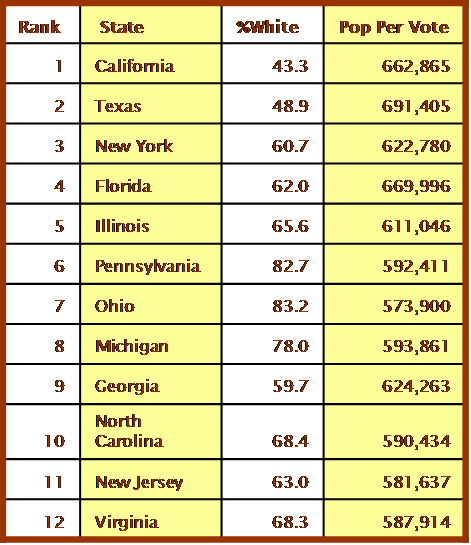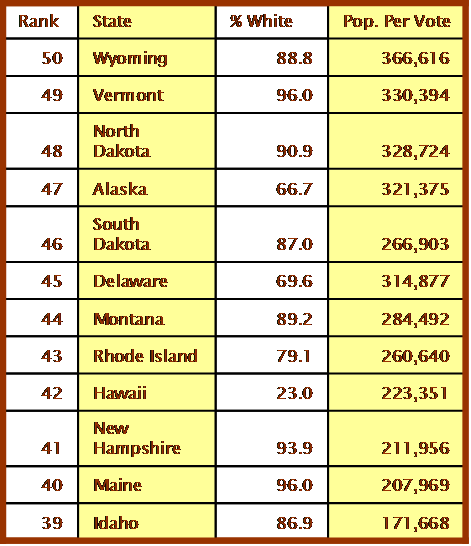Here are two graphs representing the most and least populous US states. The third column indicates what percentage of the population is White (non-Hispanic), and the fourth column shows how many people are represented by each electoral college vote.
Data on the electoral college votes and state population ranking can be found here, and the data on race comes from the 2000 Census, which was used to create the current voting districts connected to Electoral College votes.
Figure 1 Represents the Most Populous States

Figure 2 Represents the Least Populous States




Pingback: Racism in the Electoral College: Not So Much « Creative Destruction
I’ve done an analysis of the numbers. They don’t support your point of view. The trackback has the link.
Robert, as far as I can tell, Rachel didn’t present any point of view.
Oh, I see – you’re speaking across posts. Nevermind.
What I’ve always found interesting is what I call “voting power”, which is an approximation of how much one’s vote really counts in an election. My formula for it is (number of electoral votes) / (margin of victory). This works better than votes per population because, while states like Utah and Wyoming may have disproportional representation in Congress, an individual’s vote isn’t nearly as important when the margin of victory is so high. Of course, if you’re in Texas, New York or California you’ve got the double whammy of low proportional representation plus a typically large margin of victory.
the arguments about who has more power in the electoral college (states with large or small populations) go both ways. i’ve heard it argued from both sides with equal fervor.
1. Small populations get more power: as your chart shows, individual states with small populations get proportionally more vote than states with large ones. for instance, a voter in idaho represents 1/171,668 of an elector, while a voter in california represents 1/662,865 of an elector. therefore one vote in idaho contributes more to the electoral college than one vote in california.
2. Large populations get more power: since (for now anyway) most states use a winner-take-all calculation method for their states’ electors, a small swing of votes in a large state could change a large proportion of the electoral college. this was clear in the 2000 election, where a few 10’s of thousands of votes could have changed florida’s electoral contingent and thus the whole election, and in 2004, where the same was true in ohio. voters in idaho will never have that power, since the electoral college vote will never hinge on their puny number of electors. the politicians seem to believe this one because they never spend as much time campaigning in small states.
i’m not trying to argue one position or the other, actually, just pointing out that there is a legitimate-sounding mathematical argument for either side. i have a degree in math, and i honestly can’t choose between them. so my best guess is that voters in all states have about the same power unless we change the winner-take-all rules, which will make argument 2 above disappear, and thus shift the balance to give more power to voters in small states.
Pingback: Daddy, Papa and Me
“the arguments about who has more power in the electoral college (states with large or small populations) go both ways.”
Does the argument change when one is discussing not the power of the states, per se, but the power of individuals within the states?
The table is backwards on the smallest states – Wyoming should have the 171,668, going up to Idaho at 366,616.
The problem is inherent in the Electoral College system, which grants 2 votes to every state regardless of population. (Check the “Population per House seat” next to it, and there is an attempt to have each representative represent a somewhat equal number of voters – much easier with the larger states.)
DC also gets 3 electoral votes, although they have a non-voting representative and no Senators. They’re bigger than Wyoming, but smaller than Vermont.
Polymath – the electoral college could have swung on a small state – New Hampshire’s 4 electoral votes were won by Bush in 2000 by a fairly small margin (although not even close to the margin the Supreme Court declared Bush won by in Florida). Any state swinging from Red to Blue would have given Gore a win.
I never realized that liberal Vermont in the northeast was the country’s whitest state.
mandolin:
i think those arguments actually are for the individuals:
in small states 1/100,000 of an elector per voter is more than 1/600,000 of an elector per voter, but in large states, a few thousand individual voters can change the outcome of the whole election, making each voter more crucial.
i’ve been thinking about it more since i wrote that comment, and now i’m more convinced than before that it’s voters in large states that have more power, not small states; i’m convinced of this simply because experience has apparently shown presidential candidates that they should campaign in large states.
i think this probably favors minority voters rather than marginalize them, as i suspect the data in the post were trying to suggest. if a candidate could, for example, swing all african-american voters in california to his or her side instead of having them split evenly, that’s worth much more than swinging all voters in montana, since it might be enough to win all of california’s electoral votes. given the choice of whose concerns to listen to, if i were only interested in victory, i’d favor californian african-americans over the entire state of montana.